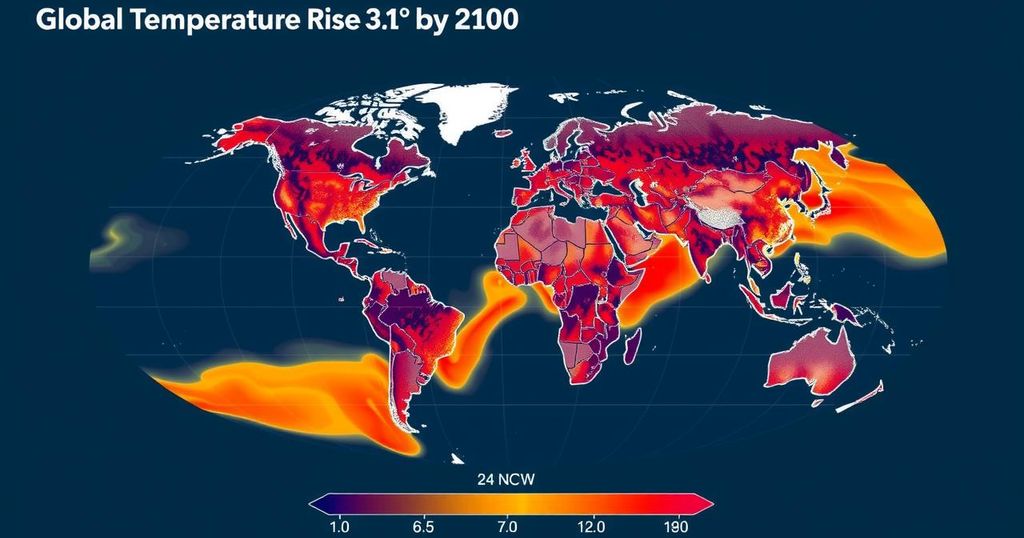The UN report warns of a potential 3.1°C increase in average global temperatures by 2100 if nations fail to significantly cut greenhouse gas emissions. Current commitments are deemed insufficient, necessitating a reduction of 42% by 2030 and 57% by 2035. The Secretary-General urges immediate action, emphasizing that without drastic measures, the targets set in the Paris Agreement will likely be missed, leading to severe climate consequences.
A recent United Nations report has projected that, if significant action is not taken to curb greenhouse gas emissions, the average global temperature could rise by as much as 3.1°C by the year 2100. This analysis underscores the urgent need for nations to act collectively and with greater ambition to adhere to the objectives laid out in the Paris Agreement, which aims to limit temperature increases to well below 2°C and preferably to 1.5°C. The report, released on October 24, 2024, during the COP16 global biodiversity conference in Cali, Colombia, emphasizes that current national commitments are insufficient. It argues that countries must reduce their annual emissions by 42% by 2030 and 57% by 2035 to remain within the desired temperature limits. The UN Secretary-General, António Guterres, has articulated that the emissions gap—a disparity between the current trajectory of emissions and the levels necessary to mitigate climate change—is not merely theoretical but has direct implications for the frequency and severity of climate-related disasters. The report also highlights the crucial role of technology in achieving these reductions, suggesting that substantial cuts can be made utilizing existing, affordable technologies. An increase in the use of renewable energy sources such as solar and wind could contribute significantly to these goals. However, collaborative international efforts will be essential, and current trends suggest a lack of commitment from governments worldwide to meet these critical objectives.
The topic of climate change has gained increasing attention over the years, particularly following the establishment of the Paris Agreement, which encourages nations to undertake serious commitments to reduce greenhouse gas emissions. Since its inception in 2015, the agreement has aimed primarily at preventing global temperatures from rising to dangerous levels. The recent UN report serves as a stark reminder of the urgency of the climate crisis, noting that the collective failure to adhere to these commitments could lead to catastrophic environmental outcomes. Such consequences are already visible in the form of heightened natural disasters and changing weather patterns worldwide. The UN’s call for immediate and strong action aligns with its ongoing efforts to prioritize environmental consciousness in the global political agenda.
In conclusion, the United Nations report serves as a critical warning that without immediate and significant reductions in greenhouse gas emissions, a disastrous rise of 3.1°C in global temperatures by 2100 could be unavoidable. This scenario necessitates collective international action and heightened ambitions from all nations to meet the targets of the Paris Agreement. The emphasis on utilizing existing technologies highlights a pathway forward, yet the success of these strategies will hinge on unprecedented cooperation among countries, particularly the largest emitters. The stakes are high, and the time for action is now.
Original Source: cleantechnica.com






